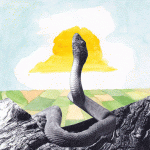
Woods Bend Beyond
(Woodsist)
Sun and Shade saw Woods experiment with everything from electrified kraut-rock to wispy 1970s-style folk songs. But while I did enjoy aspects of that effort, it seemed to fall victim to its own tenuous ambitions. Long distorted epics like Out of the Eye and Hallogallo clashed against softer-spoken tunes like Wouldn’t Waste and Be All Be Easy in a mesh of utter incoherence. Bend Beyond displays the continuation of these experiments, but in a much more focused and fruitful direction.
Woods have taken a massive leap towards accessible songwriting on Bend Beyond. The band’s obvious single, Cali In A Cup, possesses probably the strongest hook Woods have ever put to tape. “Just to rely on Cali in a cup / Another side of / How can we ever love,” lead singer Jeremy Earle sings in his usual child-like falsetto. The lyrics are pretty direct, simple, and utterly infectious. The album’s closer, Something Surreal, features a similarly irresistible lyric. The line, “Dreams form a sky / Picture reflection in the shape of that night,” has been stuck in my head for days. I’ve whistled it in the shower. Hummed it on the side of a street like a mentally disturbed hobo. I even caught myself singing it aloud as I walked along a busy avenue, while startled strangers awkwardly kept their distance and pretended not to hear.
The band’s sound has also taken a pretty significant leap forward. While Woods did make significant psychedelic strides on their previous album, and continue that sound on this release, they also make an equally great effort to flaunt their sophisticated songwriting ability and matured ear for arrangement. Find Them Empty is probably the best song to come from this direction. As the track grooves along with thudding bass lines, bright organ bursts, and off-the-cuff guitar solos, one can’t help but think of Woods as a band of quasi-60s psych revivalists. This isn’t to say Woods sound entirely derivative by any means, as they do pepper their songs with elements that are definably their own. However, one can often hear faint reverberations of bands like The Grateful Dead, The Doors, and The Velvet Underground throughout this album.
Some of the most fascinating sounds on Bend Beyond are actually buried deep under the main tracks. Cali In A Cup has some sort of mushy percussive sound loop that adds a subtle, yet integral texture that fills out the empty spaces of the song. This is undoubtedly the contribution of Tape-loop technician, G. Lucas Crane. His handiwork can also be heard on notable cuts like Wind Was The Wine and Is It Honest, where he integrates some more abrasive and heavily distorted loops to contrast the band’s acoustic-folk instrumentation.
However, at times this experimentation is carried just a little too far and some of the songs suffer for it. For example, Cascade starts out as an interesting instrumental piece, but as the track continues, Woods fail to really move the piece forward with any coherent melody. Instead, they haphazardly overload the track with bizarre synth tones and sloppy guitar solos. This ultimately results in a song with far more filler than content. Lily is another track that’s weighted down by it’s own overt weirdness. The track’s underlying reverse tape loops serve mostly as an unnecessary distraction from what is otherwise a brilliant performance from the band.
While Woods may falter here and there, Bend Beyond stills manages to hold its own and then some. The Brooklyn-based band may have cleaned up their sound since Songs of Shame, but their signature spontaneity and amplitude come through better than ever. Overall, the tracks here exude a new level of technical skill and creative songwriting worthy of significant commendation. If Bend Beyond is a sign of what’s to come, I think we have some great Woods records to look forward to.
26 September, 2012 - 06:21 — Andrew Ciraulo